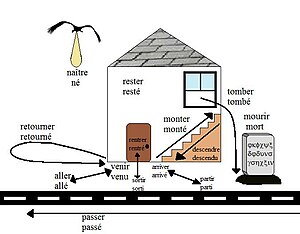What does passé composé mean?
Definitions for passé composé
passé com·posé
This dictionary definitions page includes all the possible meanings, example usage and translations of the word passé composé.
Did you actually mean poison bush?
Wikipedia
passé composé
The passé composé (French pronunciation: [paˈse kɔ̃poˈze], compound past) (meaning compound past) is a past tense in the modern French language. It is used to express an action that has been finished completely or incompletely at the time of speech, or at some (possibly unknown) time in the past. The passé composé originally corresponded in function to the English present perfect, but now there is a tendency to use the tense for all completed actions in the past as the equivalent of the simple past. Its current usage corresponds fairly closely to that of the Latin perfect tense. In British teaching of French, the passé composé is usually known as the perfect tense. The passé composé is formed using an auxiliary verb and the past participle of a verb.
Wikidata
Passé composé
Passé composé is the most commonly used past tense in the modern French language. It is used to express an action that has been completed at the time of speech, or at some time in the past. Passé composé originally corresponded in function to the English past simple, and is still used as such. Passé composé is formed using an auxiliary verb and the past participle of a verb.
Numerology
Chaldean Numerology
The numerical value of passé composé in Chaldean Numerology is: 2
Pythagorean Numerology
The numerical value of passé composé in Pythagorean Numerology is: 1
Translations for passé composé
From our Multilingual Translation Dictionary
Get even more translations for passé composé »
Translation
Find a translation for the passé composé definition in other languages:
Select another language:
- - Select -
- 简体中文 (Chinese - Simplified)
- 繁體中文 (Chinese - Traditional)
- Español (Spanish)
- Esperanto (Esperanto)
- 日本語 (Japanese)
- Português (Portuguese)
- Deutsch (German)
- العربية (Arabic)
- Français (French)
- Русский (Russian)
- ಕನ್ನಡ (Kannada)
- 한국어 (Korean)
- עברית (Hebrew)
- Gaeilge (Irish)
- Українська (Ukrainian)
- اردو (Urdu)
- Magyar (Hungarian)
- मानक हिन्दी (Hindi)
- Indonesia (Indonesian)
- Italiano (Italian)
- தமிழ் (Tamil)
- Türkçe (Turkish)
- తెలుగు (Telugu)
- ภาษาไทย (Thai)
- Tiếng Việt (Vietnamese)
- Čeština (Czech)
- Polski (Polish)
- Bahasa Indonesia (Indonesian)
- Românește (Romanian)
- Nederlands (Dutch)
- Ελληνικά (Greek)
- Latinum (Latin)
- Svenska (Swedish)
- Dansk (Danish)
- Suomi (Finnish)
- فارسی (Persian)
- ייִדיש (Yiddish)
- հայերեն (Armenian)
- Norsk (Norwegian)
- English (English)
Word of the Day
Would you like us to send you a FREE new word definition delivered to your inbox daily?
Citation
Use the citation below to add this definition to your bibliography:
Style:MLAChicagoAPA
"passé composé." Definitions.net. STANDS4 LLC, 2024. Web. 26 Apr. 2024. <https://www.definitions.net/definition/pass%C3%A9+compos%C3%A9>.



Discuss these passé composé definitions with the community:
Report Comment
We're doing our best to make sure our content is useful, accurate and safe.
If by any chance you spot an inappropriate comment while navigating through our website please use this form to let us know, and we'll take care of it shortly.
Attachment
You need to be logged in to favorite.
Log In